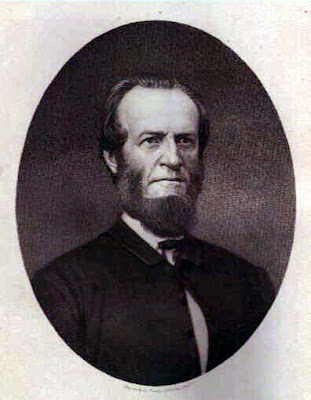A Civil War letter came to hand this week that reminded me
of a surprising, if macabre, discovery during research years ago. Mark Travis and I found the note in question at Carlisle Barracks, Pa., while working on My Brave Boys, a history of Col Edward
E. Cross and the 5th New Hampshire Volunteers.
 |
| Miles E. Peabody died in 1864. |
Private Miles E. Peabody, who lived along the North Branch
of the Contoocook River in Antrim, became a prominent character in the book
because he had written so many letters. In one batch of them, we turned up a note written after Peabody died of disease in
1864. A fill-in-the-blanks form letter from his embalmers, it had been attached to his coffin before it was shipped home.
The note was intended for either the undertaker in New
Hampshire “or friends who open this coffin.”
It read:
“After removing or laying back the lid of the coffin, remove
entirely the pads from the sides of the face, as they are intended merely to
steady the head in traveling. If there be any discharge of liquid from the eyes,
nose or mouth, which often occurs from the constant shaking of the cars, wipe
it off gently with a cotton cloth, slightly moistened with water. This body was
received by us for embalmment in pretty good condition, the tissues being
slightly discolored. The embalmment is consequently good. . . . The body will
keep well for any length of time. After removing the coffin lid, leave it off
for some time, and let the body have the air.”
Later, I couldn't help but read this passage aloud at several book events.
It seemed almost like poetry, its vivid phrases, simple words and quiet pace
instructing but also mesmerizing. Audiences listened in rapt silence. And the author of the note stuck the landing. After reading
that final phrase, “. . . and let the body have the air,” I had to take a
breath. The audience often murmured.
For all its practical advice, this little poem conveys the meaning of the
Civil War as well as any of the many gory accounts of death in battle I’ve
read. It connects the dead with those who mourn them – the “friends who open
this coffin.” Defying reason, it turns the mind to the notion that the corporeal state is eternal. “The body will keep for any length of
time.”
The letter that woke this memory was provided by my
friend David Morin. It was recently published with
substantial genealogical information on Cow Hampshire, a New Hampshire history
blog.
 |
| Amos. S. Billingsley (1818-1892) |
Amos Stevens Billingsley, chaplain of the 101st Pennsylvania Volunteers, wrote the letter. Billingsley, a Presbyterian minister and missionary before the war, had
been captured and held at Libby Prison in Richmond in 1864. After his release he
was assigned to the Union military hospital at Fortress Monroe on the tip of
the Virginia peninsula.
The subject of Billingsley’s letter is Orvis Fisher, a 1st New
Hampshire Cavalry private who had a short yet fatal term of service. A father
of four from Fitzwilliam, N.H., he enlisted on March 22, 1865, and began to show
symptoms of meningitis three weeks later.
Here is Billingsley’s letter to Fisher’s wife, written on
April 20, as the Union army was ending the last hopes of the Confederacy. Billingsley seemed to be under
some regulatory obligation to withhold the date of Fisher's death from his wife, Sarah. It was April 18. Billingsley employs the standard biblical balm. but like the embalmers’ instructions to the friends and family of Miles
Peabody, his letter seeks to soothe with reassuring details about Fisher’s earthly remains.
U.S. General Hospital,
Fortress Monroe, Va.
April 20th, 1865
Mrs. O. Fisher
Bereaved Friend,
Man being born unto trouble this life is full of trials, yet
in all the Saviour says “Be of good cheer, let not your heart be troubled.”
Only trust in God and He will make all things, all these trials, afflictions
and loss work together for your good. Rom 8:28.
 |
| Orvis Fisher |
These remains may be procured in the following manner. You
have only to leave an order with the nearest Express office whose Agent will
cause the body to be forwarded from here to any address you may furnish him.
The expense of this may be learned at the office as the Co. assumes the charge
of the entire business. The same person, who has the charge of the burials,
sees to the disinterment of bodies for transportation. By writing to Dr. E.
McClellan you may obtain receipts to sign and return, after which you will
receive the effects of deceased, if any there be.
The exact date of death we are not at liberty to give, but
it may be had by addressing the Adjt Genl at his office, Washington. A lock of
his hair was preserved which you will please find enclosed. I saw him often on
his death-bed, but he was unconscious, so much so that I could not get an
expression of his religious feelings.
He was so for a week ere he died, says the Ward Master who
wrote you several days since his death. . . . May God comfort you in this sad trial.
Your Sympathizing Friend,
Chap. A.S. Billingsley
*
Fisher’s body was later moved to Hampton National Cemetery
in Virginia. Sarah Fisher received a pension and a stipend for her two younger children.
No comments:
Post a Comment